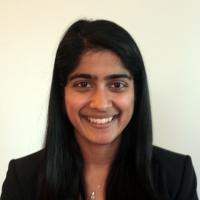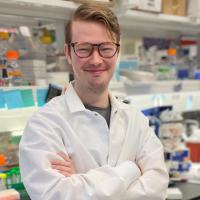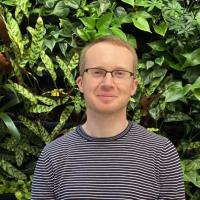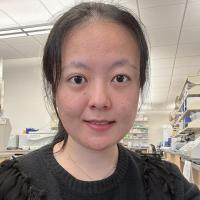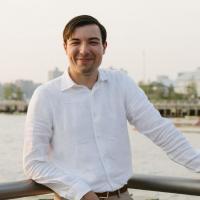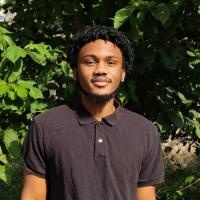Members

Faculty
Monica Kasbekar, MD, PhD
- Assistant Professor
Monica received her B.S. in chemistry from the University of Virginia in 2010. She then received her Ph.D. from the University of Cambridge and the National Institutes of Health in 2016 as an NIH-Oxford-Cambridge Scholar. During her doctoral work, she trained with Professor Chris Abell and Dr. Craig Thomas to identify and characterize small molecule inhibitors of the Mycobacterium tuberculosis fumarate hydratase. She also worked with Dr. Louis Staudt at the NCI, using genome-wide CRISPR-Cas9 screens to identify mechanisms of response and resistance to ibrutinib in diffuse large B-cell lymphoma. She then received her M.D. in 2018 from Washington University in St. Louis, where she was a member of the Medical Scientist Training Program. She completed her residency in Internal Medicine at Massachusetts General Hospital in 2020, before moving to Columbia University Irving Medical Center for fellowship in Medical Oncology. She joined the Passegué lab in 2022 to investigate the mechanisms that drive clonal hematopoiesis in the aging bone marrow niche.

Postdoctoral Fellows
Daniel Aldridge, PhD
- Postdoctoral Fellow
Daniel received his B.S. in biology from the University of Florida in 2016. Here he worked in the laboratory of Dr. Mark Wallet investigating mechanisms of reactivation of latent HIV-1 that could be used for therapeutic benefit. He then pursued an M.Sc. in integrated immunology at the University of Oxford, where he performed his thesis work in the laboratory of Prof. Paul Klennerman researching the role of cytotoxic CD4+ in controlling HIV-1 infection. Led by his interest in immunology, Daniel went on to perform his Ph.D. studies in the laboratory of Dr. Christopher Hunter at the University of Pennsylvania. Here, Daniel investigated the role of the cytokine IL-27 in regulating innate and adaptive immunity to the parasite Toxoplasma gondii. This sparked his interest in the signals governing hematopoietic stem cell development during infection and inflammation, leading him to the Passegué laboratory where he is studying how HSCs respond to, and are shaped by, infection.

Oakley Olson, PhD
- Associate Research Scientist
Oakley received his B.S. in biochemistry and molecular biology from Brown University in 2006. He then worked as a technician at Stanford University in the lab of Steven Foung, investigating humoral immune response to HCV and H5N1. From this experience, Oakley developed a keen interest in studying disease pathogenesis and moved on to Memorial Sloan Kettering Cancer Center, where he received his Ph.D. in 2016. There he worked in the lab of Johanna Joyce studying tumor-myeloid interactions, specifically the role of tumor-associated macrophages in chemoresistance and obesity-associated neutrophilia in promoting breast to lung metastasis. In 2018 Oakley Joined the Passegué lab where he is now investigating how stress dynamically alters myeloid progenitors to increase the output of specific mature populations. Combining single-cell RNA sequencing expression analysis, lineage tracing, single-cell differentiation assays, and immunofluorescence of the bone marrow microenvironment his research seeks to identify the mechanisms by which emergency myelopoiesis alters developmental trajectories and how this contribute to phenotypic heterogeneity in the mature myeloid compartment. Given that aberrant myelopoiesis is implicated in the pathogenesis of many diseases, from cardiovascular disease to cancer, understanding these regulatory mechanisms has significant translational potential.

James Swann, VetMB, DPhil
- Damon Runyon Cancer Research Fellow
James qualified as a veterinarian from the University of Cambridge in 2010 before completing his residency in small animal internal medicine at the Royal Veterinary College in London to become board-certified in 2016. He then completed his doctoral studies at the Kennedy Institute of Rheumatology, University of Oxford, investigating the impact of chronic inflammatory arthritis on hematopoiesis, and received his DPhil in 2020. He has joined the Passegué lab to develop his current interest in the intersection of emergency myelopoiesis mechanisms and development of leukemia.

Students
Melissa Proven
- PhD Student
Melissa received a BS in microbiology from the University of Rochester in 2020. Following graduation, she entered the Biological Sciences Doctoral Program at Columbia, and joined the Passegué Lab in 2021. Melissa is researching the epigenetic alterations observed during HSC aging and investigating potential HSC rejuvenation approaches in mice.

Ruiyuan Zhang
- PhD Student
Ruiyuan (Ray) graduated with a B.S. and a M.S. in Biology from University of California, San Diego in 2020. She joined the Passegué lab in 2022 as a PhD candidate and mainly focuses on mouse bone marrow niche. With a collaboration with the Vunjak-Novakovic lab in the Biomedical Engineering department, she hopes to establish a bone-marrow-on-a-chip model recapitulating key characteristics of the bone marrow niche and uses it to study how hematopoietic stem and progenitor cells behave in different conditions like aging and leukemia.

Staff
Bradley Allen
- Laboratory Manager
Bradley received his MSci in Biological Sciences from the Royal Veterinary College, University of London, in 2020. After graduation, he started out as an Animal Care Technician at Envigo in Bicester. After gaining experience working with experimental mouse models, he moved on in 2021 to work at the Medical Research Council. There, he worked as an Embryology Technician in the Mary Lyon Centre, contributing to the National Mouse Archive by cryopreserving and rederiving mouse strains.
From there, Bradley wanted to pursue a more hands-on career in research, moving in 2023 to work as a Research Technician at the University of Oxford. He worked in the Ray Lab at Oxford’s Centre of Diabetes, Endocrinology and Metabolism, primarily supporting research in circadian and iron biology.
Bradley joined the Passegué Lab in 2024 to support research and establish additional experimental mouse techniques in the lab.

Brian Heubel
- Staff Associate
Brian received a MS in molecular biology and genetics from the University of Delaware. Studying a
putative therapeutic for osteoporosis. Before working the Kalderon lab at Columbia researching adult
stem cells in the drosophila ovary. Until, joining the Passegue lab in 2025 as a research associate
focused on spatial imaging of the bone marrow niche in aging and disease.
Brandon Wright
- Technician
Brandon received a B.S. in biology from the City College of New York in 2020 as an NIH-MARC scholar. During his undergraduate studies, he pursued research in a genetics lab examining the physiological changes within transgenic Drosophilae. He joined the Passegue lab in 2022.

